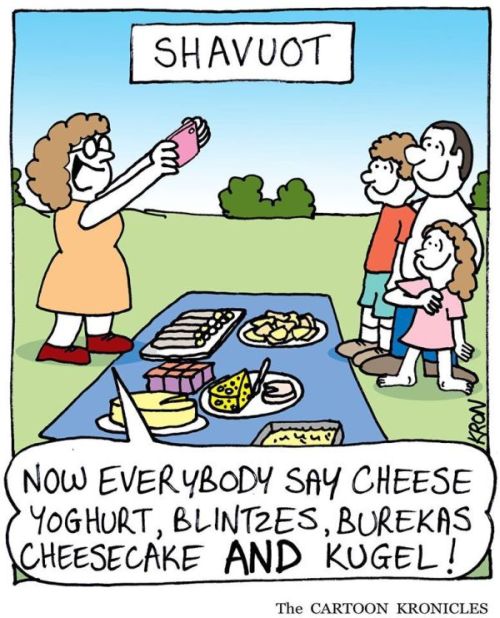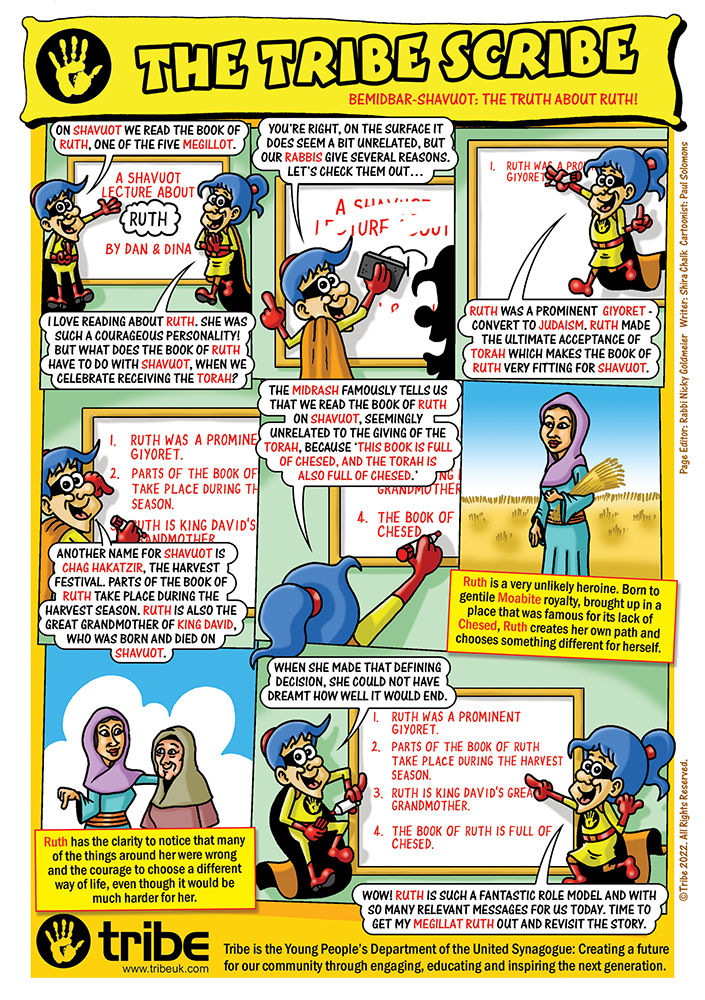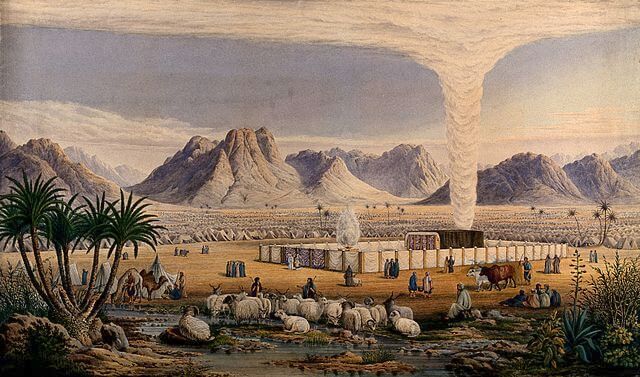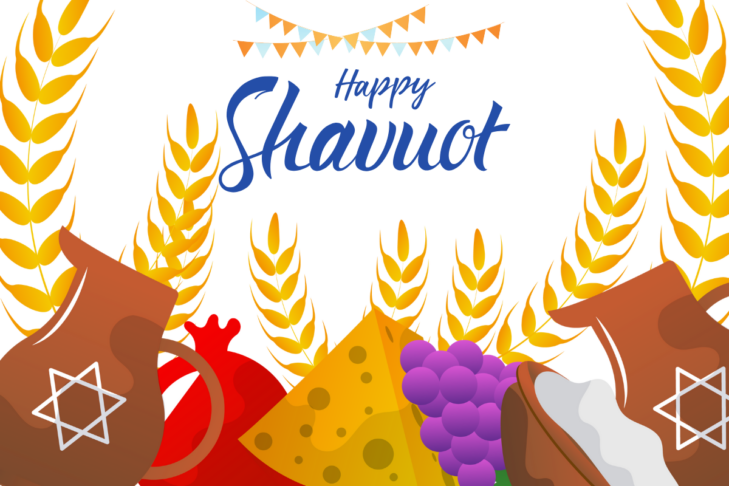Bonjour / Hello [nickname_else_first_name],
SEFIRAT HAOMER BOOKLET
Isaac Darwiche has put together this years booklet for Sefirat Haomer which can be found here
CLICK HERE to Download the MA SFIRAT HA'OMER booklet
Table of contents
1) Perashat Hashavoua - Rabbi Eli Mansour
2) Halakhat Hashavoua (Halakhot related to day to day life) By Hazzan David Azerad -
What parts may be omitted to enable praying in a Minyan ? (peninei halacha)
3) Holy Jokes!
4) For KIDS

This Week's Parasha Insight with Rabbi Eli Mansour
Parashat Bamidbar: Perfecting Our Middot Through Parenting
The Torah in Parashat Bamidbar briefly recounts the death of Nadab and Abihu, Aharon’s two older sons: "Nadab and Abihu died before God…and they had no children" (3:4). The Gemara in Masechet Yebamot interprets this verse to mean that Nadav and Abihu died because they did not beget children. On this basis, the Gemara establishes that one who does not involve himself in Periya Ve’ribya – the Misva of begetting children – is liable to death, just as Nadab and Abihu died because of their refusal to have children.
The commentators raise the question as to how the Gemara can attribute Nadab and Abihu’s death to their decision not to have children. After all, the Torah right here in this Pasuk states explicitly that they died on account of their irreverence toward the Mishkan, for bringing an unwarranted offering. And the Midrash gives other reasons for their untimely death – drinking wine before entering the Mishkan, and acting disrespectfully toward Moshe and Aharon. How, then, are we to understand the Gemara’s comment that Nadab and Abihu died because of their decision not to beget children?
The Hatam Sofer (Rabbi Moshe Sofer of Pressburg, 1762-1839) explained that Nadab and Abihu’s refusal to have children is the root cause of their other sins, which all have to do with a lack of respect. The irreverence they showed toward Moshe and Aharon and toward the Mishkan was the result of their failure to cultivate proper Middot (character traits) – a failure which could have been averted if they had begotten children. Parenting, the Hatam Sofer says, is the most effective means of perfecting one’s character. Children look to their parents as examples to follow, and thus parents have no choice but to be careful how they speak and act. Keenly aware of the effect our behavior has on our children’s character development, we are forced to conduct ourselves in a dignified, respectful and becoming manner. Strange as it may seem, parenting is not only about building our children, but also about building ourselves. We perfect our characters by being parents, as the role forces us to conduct ourselves in the way we want our children to behave. And so, the Hatam Sofer says, Nadab and Abihu died because they did not have children. Being childless denied them the opportunity to develop their characters and their sense of humility and respect, and thus indirectly caused their untimely death.
On Shabuot we read the Aseret Hadibberot – the Ten Commandments that Beneh Yisrael heard at Sinai. The Midrash comments that the Ten Commandments are divided into two sets of five, and each commandment corresponds to the parallel commandment in the other set. Thus, for example, the first commandment – "I am Hashem your God" – corresponds to the sixth commandment – murder – because murder constitutes the destruction of the divine image. The second commandment – idolatry – corresponds to the seventh commandment – adultery – because worshipping a foreign deity is a betrayal of God comparable to marital infidelity. Interestingly enough, according to this structure, the fifth commandment – honoring parents – corresponds to "Lo Tahmod," the prohibition against envy. The Midrash explains that somebody who is envious of other people will have children who disrespect him and will show respect to other people in their lives, instead, and this accounts for the implied link between these Misvot.
Why are disrespectful children the consequence of envy?
If children grow up around envious parents, who frequently speak of their desire to have what others have, then they, the children, will naturally become envious people. And it is then likely that they will be envious of their friends’ parents. If we cause our children to be jealous people, we may very well be causing them to disrespect us – because they will be jealous of their friends and show greater respect to their friends’ parents than to their own parents.
Parenting is a precious privilege and opportunity for many reasons, and one reason which we should not overlook is the way it can help us become better people. But this will only happen if we remember how much our behavior affects our children’s development, that the way we act directly impacts upon their characters. By being careful how we act and speak around our children, we not only help them develop and cultivate proper Middot – but we help ourselves perfect our own characters, as well.

Halachot this week are selected and Translated by Hazzan David Azerad
The Mitzvah of Keriat Shema (The Recital of Shema) peninei halacha
It is a positive biblical commandment to recite Shema at night and in the morning, as it is written (Deuteronomy 6:7), “And you shall say them… when you lie down and when you get up.” “When you lie down” denotes nighttime, and “when you get up” refers to morning.
We read three paragraphs, the first: “Shema Yisrael” (“Hear O Israel”) (Deuteronomy 6:4-9), with which we accept the yoke of Heaven, and which discusses the unity and love of Hashem. The second is “V’hayah Im Shamo’a” (“And if you follow”) (Deuteronomy 11:13-21), which includes the acceptance of the yoke of the mitzvot. The third is “Vayomer” (“And He said”) (Numbers 15:37-41), including a command to remember the mitzvot through the commandment of tzitzit, and mention of the Exodus from Egypt.
The Chachamim arranged the Shema paragraph to precede V’hayah Im Shamo’a so that a person will first accept the yoke of Heaven, and only afterwards accept the yoke of the mitzvot. They also placed V’hayah Im Shamo’a which involves a general mandate to keep all the mitzvot, including those performed during both day and night, before the Vayomer paragraph, which discusses the mitzvah of tzitzit, performed only during the day (Berachot 13a).
In the opinion of some Rishonim, the biblical commandment is just to recite the verse “Shema Yisrael.” According to them, this is the meaning of (Deuteronomy 6:6-7), “These words I am commanding you today must be in your heart…when you lie down and when you get up.” However, the Chachamim instituted reciting the entire three paragraphs.
It can be explained that the essence of the mitzvah of Keriat Shema is indeed that a person accepts upon himself the yoke of Heaven, and for that reason, even one who only recites the first verse fulfills the biblical commandment. Yet, the more a person enhances his acceptance of the yoke of Heaven, the more completely he fulfills the biblical commandment. Therefore, the Chachamim instituted the recital of all three paragraphs, for within them are the fundamentals of faith, the acceptance of the yoke of the mitzvot, and the remembrance of all the mitzvot through the mitzvah of tzitzit. Hence, in actuality, we fulfill the biblical mitzvah by reciting all three paragraphs.
Bevirkat Shabbat Shalom Umevorach
David Azerad
3) HOLY JoKeS!!
Selection of funny snippets, loosely related to this weeks parashah or current events, to brighten your day



4) FOR KIDS
Click on the image to open the youtube video















